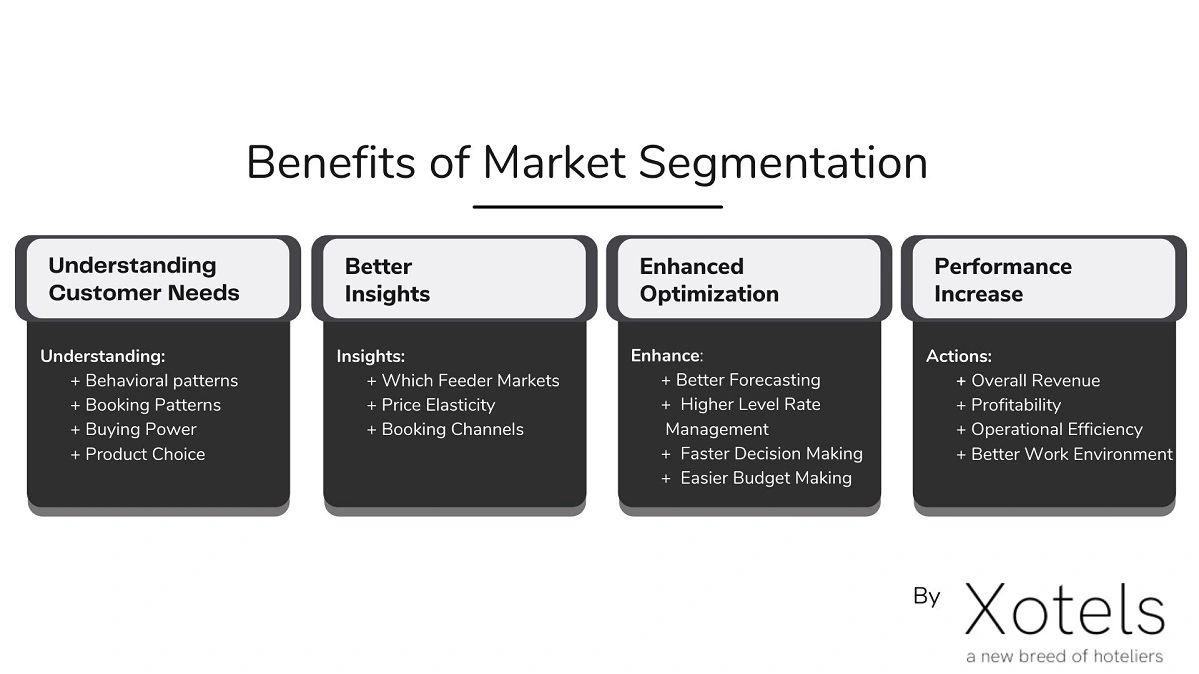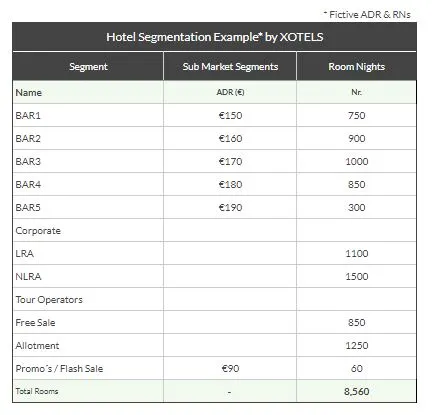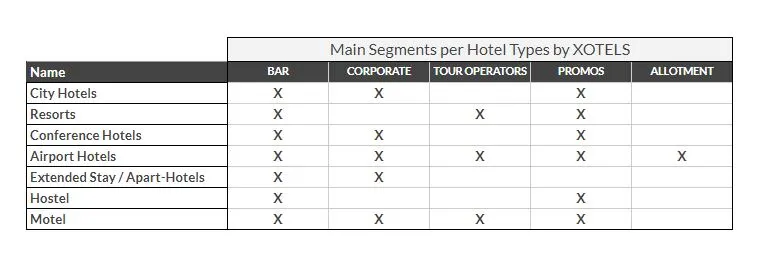Hotel Market Segmentation
One of the components needed to apply a hotel revenue management consulting is market segmentation. It allows you to target and market to a variety of consumer groups with different behaviour with an offer that matches their needs and budget level.
What is Hotel Market Segmentation?
As a revenue manager or hotelier, your hotel market segmentation shall help to identify the purpose of the trip: either business or leisure. The price does not decide the market segmentation. A clear distinction must also be achieved between individual and group business.
The market segmentation helps in identifying the trends of your business that allow your hotel to increase your revenue performance:
- Length of Stay
- Day of Weeks stays
- Total Revenue per Room, Total Revenue per Client
- Booking Lead Time
- Cancellation %
- No Show ratio
Benefits of Hotel Market Segmentation

Today’s ways of booking make it difficult to identify the purpose of the trip. Segment by default the individual bookings for short midweek stays as business, and identify as leisure reservations of double rooms over the week-end.
And when it comes to bookings made directly on your hotel website? You can also introduce the following question in the reservation process on your hotel website: Is your reservation for business stay or leisure?
You may want to introduce sub-segments such as your pricing points such as BAR and how yieldable the segment is.

Examples of Hotel Market Segments
Let’s take you through the individual hotel segments:
Public
Otherwise known as “BAR” or Best Available Rate. These rates are typically seen in the following variations:
- BAR Website – Best Available Rate sold through the website
- BAR Direct – Best Available Rate sold direct by phone, email, fax
- BAR Indirect Commissionable – Best Available Rate sold trough commissionable online travel agencies
- BAR Indirect Net – Best Available Rate sold through net rate online travel agencies
Promotions
Any rate that qualifies as a “discount” from the regular public rates and falls within the below categories:
- Opaque; hidden hotel discount programs
- Flash Sales; promotional website offering membership discounts
- Mobile; mobile websites offering same day or last minute discounts
- Online Campaigns; internet publication offers and packages
- Offline campaigns; print publication offers and packages
- Special Event; packages and offers during holidays, festivals, concerts
Negotiated Rates
Negotiated rates are typically unpublished (not available to the public/private rate) rates given to businesses (like the mentioned below) in exchange for a guaranteed amount of rooms that will be taken over the span of a certain period of time (contract period – usually renewed annually):
- Corporate Dynamic Rates
- Corporate Flat Rates
- Government
- Crew
Groups
The Group segment is a versatile mix of leisure as well as business guests. Usually, customers in this segment combine their hotel stay with an event or other form of activity or business taking place at a hotel or in close proximity to the property. Group rates include:
- Leisure
- Business
- Conference / Banquet
- Incentive
- Wedding
- Events
- Crew
Wholesale
Similar to negotiated rates, in the way larger volumes of rooms are sold/contracted for lower ADRs – or price per room if you will. Since rooms are sold in bulk far in advance of the arrival date it is possible to reduce the ADR in exchange for less risk and reduced COA (Cost of Acquisition) per individually sold room.
- FIT
- Tour Operators
- Wholesalers
Other
Last but not least, the segment “Other” includes important segments that can’t be missed such as Complimentary and Overbookings which are often used across the hotel industry. The following can be considered to fall under the “Other” segment:
- Complimentary
- Barter
- Walk-In
- Overbooking (from another hotel)
- House Use
- Timeshare
The above segmentation is a general guideline. You may find that for your hotel there are other segments which are not included, or a simpler segmentation would be more applicable. Each hotel has to decide what segmentation best fits their market, property and revenue management strategy.
Come across any hotel or revenue management term or phrase that you have not heard of before? We have likely covered it in our Hotel Glossary.
Market Segmentation Differences Depending on the Hotel Type
Differences in applicable hotel markets segments exist. In the table below we have created an example indicating what each of the main hotel types could expect in terms of business. Note that this is just a general example and that variation in the hotel industry is great, meaning any hotel can have other market segments making up part of their business mix.

Jump to the next chapter to discover how to know which parts of your business can be yielded through hotel revenue management consulting.






